Fair Trade
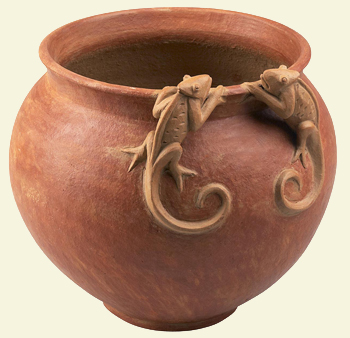
Terra Cotta Chameleon Pot
Collaborating chameleons keep a watchful eye on your plants. This terra cotta pot from Bamessing, Cameroon is made from local clay and finished with natural local ocher clay.
Bamessing is a pottery center in Cameroon’s Northwest, where traditional crafts are made and sold throughout the region and the rest of Cameroon. Ceramics provide needed income that supplements farming, helping provide funds for children’s schooling. Artisans throw pots on the wheel, using hand-dug local clay.
11” diam. x 10” high
$39 from Ten Thousand Villages
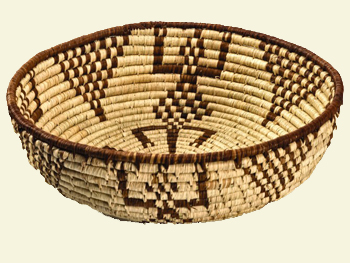
African Lizard Basket
Coiled raffia basket made by women artisans in Cameroon features a graphic lizard design, created using raffia that has been naturally dyed with wood ash. The basket is sturdily constructed with nice depth for display or use.
10” diam. x 3” high
$19 from SERVV
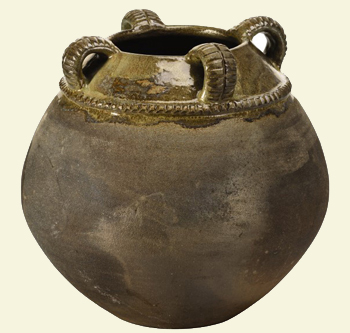
Four-Handled African Water Vessel
Traditional water storage vessels are partially glazed for beautiful contrast of lustrous color and texture. Surface flashing results from wood firing process and will vary on each piece. Interior is glazed.
9” diam. x 8 ¾” high
$28 from SERVV – http://bit.ly/YwSFbg
All of this month’s recommended Fair Trade products are produced by PresCraft – based in northwest Cameroon. Men and women artisans produce traditional West African hand-craft, working at three rural production centers and earning a good income based on piece work. Some artisans combine hand-craft production at home with farming or trading. PresCraft provides employment for close to 130 artisans as well as some 260 home-based artisans. PresCraft goals include encouraging self-reliance, minimizing rural exodus to cities and preserving indigenous art and craft.
Books
Fiction
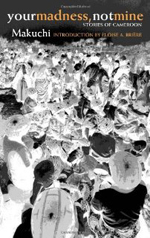
Your Madness Not Mine
by Makuchi
(1999, Ohio University Press)
The stories in Your Madness, Not Mine are about postcolonial Cameroon, but especially about Cameroonian women, who probe their day-to-day experiences of survival and empowerment as they deal with gender oppression: from patriarchal expectations to the malaise of unemployment, and the attraction of the West.
“The characters Makuchi creates are survivors; they are scrappy and they are strong, especially the women. She wields her pen like a pioneer’s axe in the forest, clearing new spaces…that invite us to consider realities we would otherwise never know.” — from the introduction by Eloise A. Briere
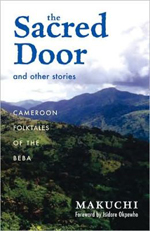
The Sacred Door and Other Stories: Cameroon Folktales of the Beba
by Makuchi
(2008, Ohio University Press)
Author Makuchi retells the stories that she heard at home when she was growing up in her native Cameroon. This collection of thirty-three folktales showcases a wide variety of stories that capture the richness and complexities of an agrarian society’s oral literature and traditions. Revenge, greed and deception are among the themes that frame the story lines in both new and familiar ways. Makuchi relates the stories her mother told her so that readers can make connections between African and North American oral narrative traditions. These tales reinforce the commonalities of our human experiences without discounting our differences.
“A collection that draws readers into the world of African everyday life and then keeps us there, maintaining a level of excitement while seamlessly providing an enchanting cultural education.” – Journal of Folklore Research
Non-Fiction
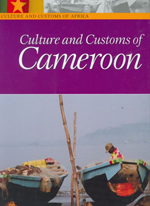
Culture and Customs of Cameroon
by John Mukum Mbaku
(2005, Greenwood Press)
Cameroon has had a turbulent and eventful modern history with German, English, and French incursions, and readers will be able to understand the current struggle for democracy post-independence. The history colors the substantial coverage of the many topics examined, from education, to marriage and women’s roles, sports, and holidays, daily life, the arts, and much more. This volume is a definitive, accessible introduction to Cameroon.
“Culture and Customs of Cameroon gives a clear, informative analysis of the dynamic Cameroonian world-view and offers the reader tools to delve further into Cameroon’s cultural patterns.” – Round Tables
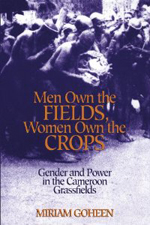
Men Own the Fields, Women Own the Crops: Gender and Power in the Cameroon Grassfields
by Miriam Goheen
(1996, University of Wisconsin Press)
Women’s labor—producing both crops and children—has long been the linchpin of male status and power throughout Africa. This book lucidly interprets the intricate relations of gender to state-building in Africa by looking historically at control over production and reproduction, from the nineteenth century to the present. Though men obviously dominate their society at both the local level and nationally, women have had power of their own by virtue of their status as women. Men may own the land, for example, but women control the crops through their labor.
“One of the charms of this book is the self-evident way in which gender emerges as a crucial issue in what some might see as a different topic: the articulation of local and national politics.” – www.highbeam.com
Films
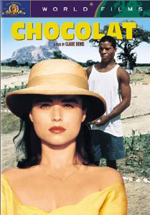
Chocolat (1989) – purchase at Amazon or rent from Netflix
French with English subtitles – directed by Claire Denis
Not to be confused with the Miramax film starring Juliette Binoche, Claire Denis’s “Chocolat” documents French colonialism in Cameroon through the eyes of a young French girl named France, her mother Aimée, her father Marc and their servant Protée. The film begins in Cameroon with an adult France accepting a ride from a black man and his son. Soon, we are swept back to her childhood, spent in a roomy house staffed with servants. One such servant, Protée, has a special, almost secret relationship with France as he teaches her bits of his culture and keeps her out of trouble. As more white people descend upon the family, Protée is pushed to the edge, especially when Aimée suggests that she, too, has demands. The effect on France, who trusts Protée more than she does anyone else, is devastating.
“…remarkable and quietly devastating…” – The Boston Globe
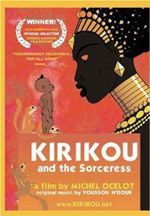
Kirikou and the Sorceress (2000) – purchase at Amazon or rent from Netflix
French with English subtitles – directed by Michel Ocelot
Animated feature for children of all ages
This animated film exquisitely recounts the tale of tiny Kirikou — a clever, courageous little boy born in an African village in which Karaba the Sorceress has placed a terrible curse – as he sets out on a quest to free his village of the curse and find out the secret of why Karaba is so wicked. Kirikou depicts a precocious newborn infant who battles ignorance, and so-called evil, with endearing perseverance. This film speaks to the child within us all who yearns to express and defend the best in others and ourselves. Kirikou’s stunning visuals are accented by a traditional music soundtrack by African music giant Youssou N’ Dour of Senegal.
“The film, adapted from a West African folktale, is smart, funny and stunningly designed.” – Ken Fox, TV Guide
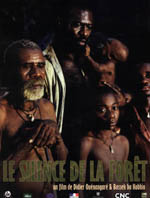
Le Silence de la Foret (The Forest) (2003)
Available from California Newsreel
In a fascinating twist on the old story of Westerner’s encounters with “exotic” African cultures, Le silence de la forêt focuses instead on what happens when a European-educated African interacts with the mythic rainforest people incorrectly and pejoratively known as “pygmies.” (They would more accurately be called the Biaka.) It is about the difficulty for even the most well-intentioned person to know and respect the “other.”
This Pan-African production features the haunting musical sounds of the Biaka as well as the contemporary score of Manu Dibango (see below).
This beautifully made pic is a powerful African production, a fascinating excursion into a little-seen world. The film develops into an unusual journey of discovery. Impeccably made, with a high level of technical expertise.” – Variety
Music
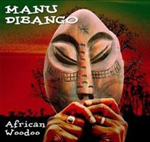
Manu Dibango – African Woodoo – Emmanuel N’Djoké Dibango is a Cameroonian saxophonist and vibraphone player. Leaving Cameroon to France to study, he got to study music when he enrolled in piano lessons. Though a piano student, Manu fell in love with his friend and classmate’s instrument, the saxophone. Not having a keyboard at home to rehearse his music lessons, he spent time using his friend’s saxophone which has today become his longest companion. He developed a musical style fusing jazz and traditional Cameroonian music.
Dibango served as the first chairman of the Cameroon Music Corporation, and was appointed a UNESCO Artist for Peace in 2004.
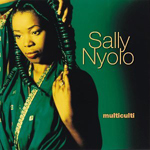
Born in the Lékié region of Cameroon, Sally Nyolo left her homeland at the age of 13 to settle in Paris. She built up her professional experience, first as a backing-singer working with numerous French or African artists, and composing music for radio and cinema. In 1993, Sally joined the group Zap Mama for their world tour. She recorded her first solo album in 1996 and became a worldwide success. After several other albums she finally returned to her native Cameroon, where she set up a studio with the intention to explore and develop the local music scene.
Watch Sally Nyolo perform the title song, Multiculti, on YouTube
